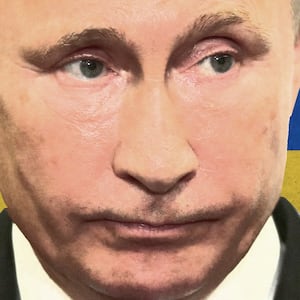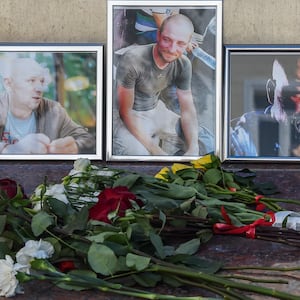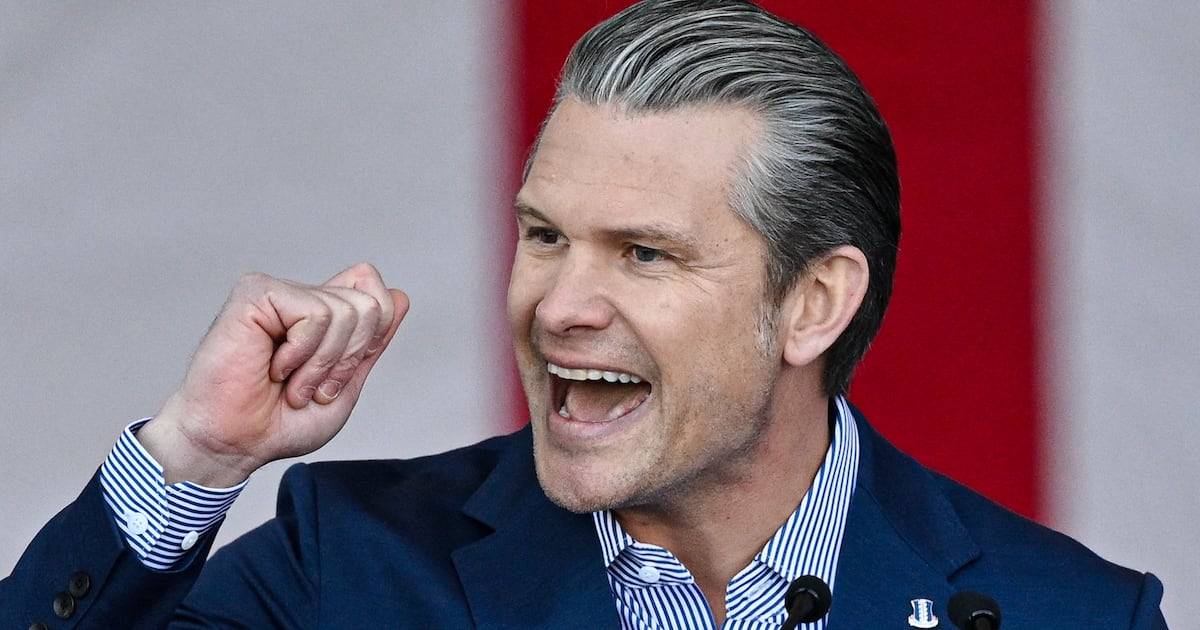MOSCOW – Best-selling Russian novelist Yulia Latynina begins her mornings with long runs on the beach, a tropical wind blowing through her flame-red hair—far away from the dark, freezing winters of her homeland.
These days Latynina, along with her mother Alla Latynina, a literary critic, and her father, the prolific poet Leonid Latynin, enjoy stunning views of a mountain valley, of blooming gardens, of light rays changing colors above the sea as they write, but for safety reasons they asked me not to mention precisely where they are. Suffice to say that they spend most of their time far away from their Moscow home.
The family’s nightmare began in 2016 when mobs of trolls attacked Latynina on social media after she published an article in Novaya Gazeta about “Putin’s chef,” billionaire caterer Yevgeny Prigozhin, who is also the Russian president’s go-to guy for such nefarious activities as internet-based attacks on American presidential elections and mercenary armies for deployment in Africa and the Middle East.
“Get out of Russia, we’ll breathe easier without your liberal stink,” one of the posts said. Soon, ugly words turned into ugly actions: Latynina’s attackers followed her for weeks until, in August 2016, somebody poured excrement all over her as she was on her way to the radio station Echo of Moscow.
Latynina has published more than a dozen bestselling crime and fantasy novels in Russia. She has been translated into French, Italian, Spanish and Polish. But Russians may know Latynina best for her weekly Echo of Moscow show “Access Code,” interpreting the Kremlin’s commands and ideology and often flaying Russia’s leadership.
Latynina is also a staff writer at Novaya Gazeta, five of whose journalists have been murdered.
As Pavel Kanygin, a leading journalist at Novaya Gazeta, told The Daily Beast that after the disgusting attack on Latynina, the paper demanded an investigation, but nothing happened. “When we speak with authorities about violence against our colleagues, we hear, ‘When you criticize the state, you should be ready for a reaction.’ Those in power are pointing at the door, as if to say, ‘Whoever does not like us, can leave.’”
Writing in Novaya Gazeta right after the first attack, Latynina claimed in her usual combative way that the mastermind behind it “could be stopped with one phone call,” and warned that “otherwise, there will be real corpses and it won’t be just Putin’s chef covered in shit but Vladimir Vladimirovich Putin, himself.”
In the end, nobody placed a call to order such an investigation. Russian police did not find the thugs, and the violence continued.
One day the brakes on Latynina’s car stopped working. Then, one night in the summer of 2017 Latynina and her parents, aged 77 and 79, were awakened by a suffocating gas filling their residence. Later a forensic study showed that the attacker used a non-lethal military grade chemical weapon. Yulia’s mother Alla Latynina told The Daily Beast that in the following few months she fell ill twice with pneumonia, which she believed was a result of the gas attack.
The Latynina haters clearly wanted the family to leave the country: they set the family’s vehicle on fire, once again in the middle of the night. Yulia’s mother woke up and saw her husband running around their burning SUV trying to find some way to put out the fire.
“That was a horrifying scene. I was scared that the vehicle might blow up when he was near it,” she said.
Shortly after the incident, the family left for Europe. “The FSB was no longer protecting its ‘monopoly over violence,’” Yulia Latynina told The Daily Beast in a recent interview, referring to the classic position of security services in authoritarian states. “In fact, the regime found a new modus operandi—it consistently farms out violence to various thugs to maintain plausible deniability.”
Latynina would have liked to see her attackers punished. ”We, journalists of Novaya Gazeta, know that Prigozhin’s structures have been focusing on us for a long time; for now this is all we know.”
“Before, we thought that Chechen leader [Ramzan] Kadyrov was the top of most dangerous topics to cover for a reporter,” she said. “The list seems to be growing.”
Last month, Petr Verzilov, one of the Pussy Riot activists, said he was poisoned after receiving an important email relating to an investigation into the mysterious deaths of three Russian journalists in the Central African Republic. Verzilov moved abroad for treatment.
Outspoken critics of the Kremlin’s policy are aware of the risks they run. Every week Russian authorities order the arrests of activists. On Sunday, police detained 12 people protesting outside the Federal Security Service (FSB) headquarters against abuses of power. One of the activists was holding a banner, which said: “Putin, leave Ukraine alone, nobody wants the war.”
In 2015 a group of assassins gunned down the man at the heart of the Russian opposition, ex-vice prime minister Boris Nemtsov, right by the Kremlin wall. It was a demonstrative gesture: the criminals showed that no federal security service was there to protect the leading critic of President Putin.
Every year thousands march in Nemtsov’s memory all over the country. Earlier this year, the city of Washington D.C. renamed the street outside the Russian embassy Boris Nemtsov Plaza.
Since 2014, the year Russia took Crimea from Ukraine and annexed it, Russia’s prominent cultural figures, writers, artists, gallery owners, musicians, film-makers, and journalists have been moving out. According to the latest study by the Russian Public Opinion Research Center, nearly every third young Russian wants to emigrate.
Earlier this month Russian liberal intellectuals gathered for the Open Russia Forum in Vilnius, Lithuania, to discuss Russia’s political future. Here, the prominent environmentalist Yevgeniya Chirikova presented her online project “Activatica,” which maps all Russian social movements and protests.
A few years ago Chirikova became a refugee from political persecution: she emigrated to Estonia after state officials threatened to take away her children.
“My friend Mikhail Beketov, editor of a local paper, was beaten severely and died; my husband was beaten and lost vision in one eye, the FSB and some social workers came to my door, asking about my children,” Chirikova told The Daily Beast.
Living abroad, Chirikova continues to think about Russia and work for Russians. “Since all our projects are virtual, we can help Russian activists defend their environment living abroad and our readership is quickly growing,” Chirikova told The Daily Beast.
Violence did not silence Latynina’s voice, either: her radio shows on Echo of Moscow come out every week, as well as her articles in Novaya Gazeta.
Opposition activists are not the only ones to leave Russia. The exile population of former Russian bureaucrats and politicians is growing, too.
Opera singer Maria Maksakova and her husband Denis Voronenkov escaped from Russia to Kiev. Both had been members of the Russian parliament and of Putin’s political party. But migration did not save them from violence.
Voronenkov testified against the Kremlin’s ally, ex-Ukrainian President Victor Yanukovych, and his wife knew retaliation was inevitable. “On the day my husband testified, I rushed to the airport in fear of persecution,” Maksakova told The Daily Beast.
In March last year, Voronenkov was gunned down in the streets of Kiev. Even then, Moscow did not leave Maksakova in peace. State TV channels, aiming to humiliate her, tell viewers again and again how wrong she was to abandon her home country.
“Russian authorities would not leave me alone, they stage public shows about me, send TV crews to hunt for me on my trips to Europe,” the exiled Russian MP told The Daily Beast. “I am not surprised. Historically, Russian totalitarian regimes treated their celebrities as property, demanding that exiled talents return or destroying them with propaganda,”
Like Latynina, like Chirikova, Maksakova thinks it will be a while before she returns to her homeland.
“I am not going to return to Russia for as long as there is this atmosphere of hate, crime and impunity,” she said.









